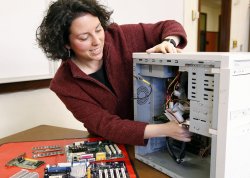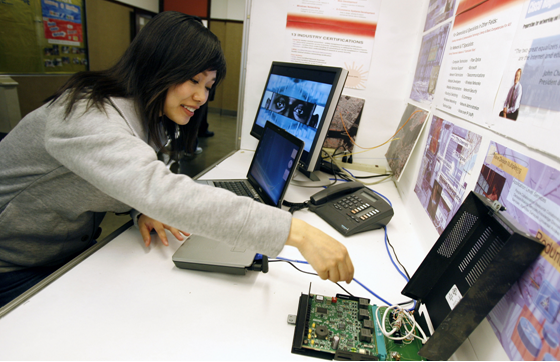Women's Success Stories

|
ABIGAIL BORNSTEIN “Digital Home Technology Integration is a huge, new, growing field, and I think women should go for it. The home is becoming more and more digital, whether it’s our stereo system, or a big screen TV, or laptops and networks and handheld devices, there’s a lot of growth in this area, and it’s not going to go away. So if you want a job that’s definitely going to be looking for employees, this would be a great area to go into.” |
Career Quick Look
| Salary: | $50K - $80K | Education: |
| Years in Field: | 6 years in high tech doing market research, 4 years as instructor in computer networking. | Computer courses, City College of San Francisco MBA, Cal State University Hayward |
| City/State: | San Francisco, CA |
Getting Started: Abigail worked in retail managing the selling floor at Macy’s from 1991 to 1993, but was not happy with her salary and work hours, and did not see much opportunity for advancement. She took a break and went to Japan to teach English until 1996. During that time, she noticed that the Internet and technology were booming and that many of her friends were doing very well financially in the field. She decided to redirect her career toward technology, and in 1997 she took a job as an administrative assistant in a hard drive company. During her breaks and lunchtime, she made a point of spending time with the engineers in the company, who shared their knowledge about the equipment and technology. She soon advanced from the administrative assistant position into market research, and this new role prompted her to also continue her schooling.
Education: Abigail went to night school to get her Masters in Business Administration (MBA) from Cal State Hayward to better prepare herself for her market research job at the hard drive company. Once she got her MBA, she realized that she also needed to have an understanding of the technology products she was critiquing and analyzing in her market research. She began to fill in her technical knowledge gaps by taking night courses at CCSF.
Her instructor at CCSF encouraged students to get certified, so she took all the A+ courses for computer technician and then passed the CompTIA A+ certification exam, a licensing exam from the Computing Technology Industry Association, Inc. (CompTIA), a consortium of computer vendors. She became CompTIA network+ certified as well. These certifications made her an attractive candidate for teaching jobs and eventually resulted in her current full-time teaching position at City College.
She found that the hands-on classes at CCSF built her confidence and helped to reinforce the learning from books and lectures. These experiences also helped her develop her own teaching style when she became an instructor.
Greatest Professional Achievement: “When I can open up opportunities for my students by providing them the tools that they’re going to need, that’s a huge accomplishment for me,” says Abigail. “I feel I’ve done well when I learn that I’ve helped my students get a good paying job and reach their goals by writing recommendations and opening doors for them.” She is involved with starting an alumni association at CCSF, so the school can stay in closer touch with students as they move about the work world. She is also helping to forge new relationships with local employers to open more job opportunities for students and alumni.
Barriers: “As a female, when people first meet me, they want to make sure that I’m technically savvy. I get challenged, and I have to prove that I really know the technology, which I don’t believe happens to men. I have to be able to explain in depth how something is done, or how it works. In my classes, they are sometimes surprised to see a woman instructor. I’ve gotten used to it now.”
Working with Men: “A lot of my female students lack confidence in what they’re doing, but they actually know just as much, if not more, than my male students. Don’t underestimate what you can do, and don’t underestimate your knowledge,” Abigail advises her women students. “You’re probably doing much better than you think you are. So don’t think that you’re lacking something and that everyone else knows more.” She recommends that women who question their abilities go to the open labs to help them understand what they’re learning in the classroom. “There’s no pressure or time constraints. The PCs there are meant to be torn apart, and you can try things out. Take advantage of it – it will build your confidence,” she says.
Although many computer classes at CCSF have more male students than female, Abigail is pleased to report that the faculty at CCSF is getting closer to 50-50. “You’re almost as likely to have a female instructor as a male, and the department chair is a woman, so there are more and more female role models – it’s changed a lot in the past three years,” she says.
Advice for Women: Abigail sees a positive future for computer networking and digital home technology: “This is a huge, new, growing field, and I think women should go for it. The home is becoming more and more digital, whether it’s our stereo system, or a big screen TV, or laptops and networks and handheld devices, there’s a lot of growth in this area, and it’s not going to go away. So if you want a job that’s definitely going to be looking for employees, this would be a great area to go into.”
“If you’re not happy with what you’re doing you can make a change” says Abigail, “You’re not stuck.” She made her own change from retail to high technology and teaching starting at about age 28. She is very glad that she took the opportunity to move into something that is a better fit for her.
She also suggests that women who want to work in this field find others to talk to and learn from who work in the field, as she did with the male engineers in her first job at the hard drive company. “You absolutely have to join a club, go talk to people who are doing what you want to do in a company, spend some time with them, ask them how they do it.” Abigail still gets together with this group of engineers for lunch and conversation once a month, even though they’ve all moved on to other jobs and companies.
Because technology changes so quickly, Abigail recommends that, “You always have to stay current. Whether you’re a teacher or a computer technician, you have to be very dedicated to ongoing education; otherwise your knowledge becomes obsolete. There’s always something new. If you like something exciting, changing, fast-paced, if you need that challenge in your life, this is a great field.”
Typical Workday/Environment: Abigail teaches courses throughout the week, both face-to-face in classrooms and online. She combines lecture and a hands-on component, so she can work with students one-on-one. She sometimes takes students on a field trip to the labs to take computers apart. She also has office hours where she works with students right in the labs. Abigail also stays connected to students throughout each day via e-mail from her work and home offices. Because computer networking may require working with a variety of equipment, bending down, and getting onto the floor and under desks, comfortable attire is essential and the dress code is casual.
Career Ladder: To become an instructor in the computer networking field, industry experience is usually required. The instructor position at CCSF requires A.S. degree with six years of industry experience, or a B.S. with two years of industry experience. Full-time instructors can move on to a department chair role, dean, chancellor, or take on a special project supported by grants or other special funding.
Professional Associations: Abigail recommends IEEE (originally an acronym for the Institute of Electrical and Electronics Engineers, Inc., but now referred to as I-triple-E), which has a student chapter for CCSF students; Women in Science & Engineering, which has a new chapter at CCSF; and Women in Technology International (WITI), which holds meetings mainly in the San Jose area. She also recommends the Professional Business Women of California, which is not necessarily technology-focused, but which offers what she describes as a fantastic conference every year and exposure to high level women.
Hobbies: Abigail enjoys traveling, and has been to 30 countries around the world. She loves having the summers off to support this hobby. She also plays the flute.
 Copyright 2010 National Institute for Women in Trades, Technology & Science | http://www.iwitts.com |


